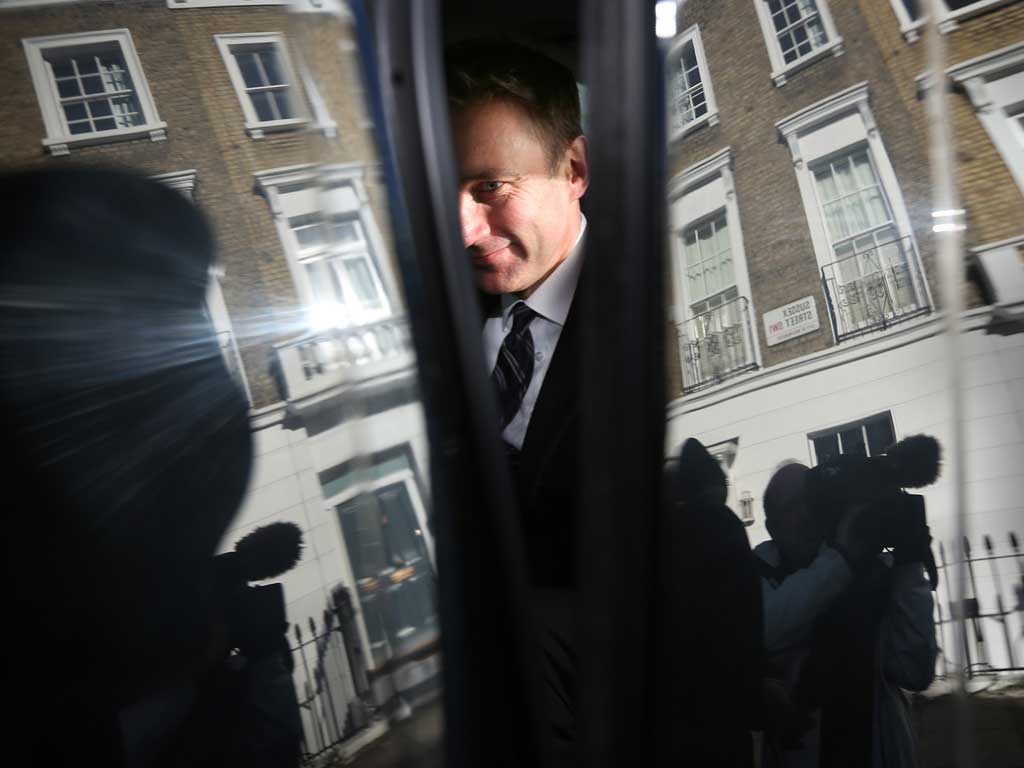John Rentoul: A textbook case of how not to defuse a scandal
Jeremy Hunt's involvement in the BSkyB bid was injudicious. By not resigning, he compounds the damage to the Government


Jeremy Hunt probably will resign, but if he does it will be for his secondary crime of misleading the House of Commons, rather than for his original misjudgement.
As All the President's Men taught us, it is the cover-up that brings down the powerful, rather than the original offence.
Hunt's handling of Rupert Murdoch's bid for total control of BSkyB does seem to have been biased. However, the bias that matters was not his support for the bid before he was put in charge of it. It was known at the time that Hunt "had expressed some sympathy for the bid", as he put it. How much sympathy we did not know until last week. Now his memo to the Prime Minister, warning that Vince Cable, the Business Secretary, should not block the bid has been published. The memo is a bit strange, because Hunt was not allowed to lobby Cable, and David Cameron was not allowed to intervene in the decision either. But that does not necessarily mean that Hunt was biased when he took over responsibility for the decision from Cable the following month.
Hunt's defence is that, precisely because he had previously expressed sympathy, he sought the advice of two independent regulators, Ofcom and the Office of Fair Trading, "which I followed". The problem with this defence is that Hunt seems to have tried to influence Ofcom to give him the advice he wanted. In one email, for example, Fred Michel, the head of public affairs for Murdoch's News Corporation, reports to his employers that Hunt "made again a plea to try to find as many legal errors as we can in the Ofcom report".
So, yes, Hunt seems to have tilted the decision in News Corp's favour, even after he took steps supposedly to insulate himself from the decision. Yet this need not have been a sacking offence. It would have been open to anyone who opposed the bid to have challenged Hunt's decision to allow it to go ahead. If that had happened, all the documents published by the Leveson inquiry, and all the witnesses giving evidence to it, would have appeared in court. The court would probably have come to the same conclusion to which most Leveson-watchers have come, and would have ordered the decision to be reconsidered by yet another cabinet minister.
That would have been embarrassing for the Culture Secretary, but not much more than it was for Cable when he was taken off the case for saying that he had "declared war" on Murdoch.
However, it never came to that, because the bid for BSkyB was withdrawn when Murdoch's News Corp hit a bigger problem, namely the revelation that its journalists had hacked the phone of a murdered teenager.
So, big fuss about nothing; gentle shake of civil service heads; and a memo for the file promising to tighten up procedures in future? Not so fast, daddy. Unfortunately for Hunt, he made a more serious mistake, which was to fail to prepare thoroughly enough for his statement to the House of Commons when Fred Michel's emails first hit the Leveson inquiry website at the end of last month. Thus he claimed to have "made absolutely no interventions seeking to influence" the decision on the bid when Cable was responsible for it. That cannot be squared with Hunt's memo to Cameron in which he warned that News Corp might go to court if the decision went against it, and said it would be "totally wrong" for ministers to "cave in" to the anti-Murdoch alliance of the BBC, Channel 4 and The Guardian.
Furthermore, as The Independent on Sunday reported at the time, Hunt said that he had had "zero" conversations with Michel during the bid process, which he appeared to contradict by saying that they had had "contact" in two meetings, at which minutes were taken, but he still omitted another face-to-face conversation and several exchanges of texts. Those are going to be hard for him to explain at the Leveson inquiry on Thursday and then, if John Bercow, the assertive Speaker, insists, in the House of Commons.
Thus this second-rate scandal is going to run on if Hunt doesn't cut it short by resigning, and it is going to continue drawing attention to the wider uselessness of the Conservative part of the coalition. Once again, it looks as if Cameron is guilty of that cardinal political sin: a failure to think things through. So he defended Hunt against the first onslaught of a hostile and mostly anti-Murdoch press, but broke the first law of reputation crisis management, which is to get all the information, good and bad, out in public as quickly as possible.
Now it is still dribbling out, in all its "merci, papa, daddy" detail. Nothing good can come of this. I suppose Hunt may be able to hang on to his job if he corrects and apologises for his misstatements in Parliament, but he is not doing the Government any good.
In any case, sacking your special adviser by telling him "Everyone here thinks you need to go" ought itself to be a sacking offence. A politician who cannot bring himself to say "I have decided, and I am really sorry about it, that you need to go" is not worth a place in the Cabinet.
Join our commenting forum
Join thought-provoking conversations, follow other Independent readers and see their replies
Comments